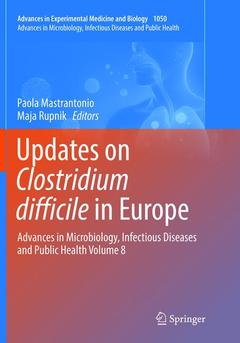Description
Updates on Clostridium difficile in Europe, Softcover reprint of the original 1st ed. 2018
Advances in Microbiology, Infectious Diseases and Public Health Volume 8
Advances in Microbiology, Infectious Diseases and Public Health Series
Coordinators: Mastrantonio Paola, Rupnik Maja
Language: English
Subjects for Updates on Clostridium difficile in Europe:
261 p. · 17.8x25.4 cm · Paperback
Description
/li>Contents
/li>Biography
/li>Comment
/li>
This book outlines the currently available clinical, epidemiological and experimental data on Clostridium difficile infection (CDI) with special emphasis on studies and results achieved in Europe.
The incidence and severity of CDI has increased significantly over the last decade, and the book explains why C. difficile, recently reclassified as Clostridioides difficile, remains a significant challenge, also from economic perspective, to health care systems all over the world. The different reservoirs of this ubiquitous microorganism are reviewed as well as the different factors contributing to its virulence, such as toxins and biofilm formation. The rapid evolution of antibiotic resistance is clearly a concern and in a specific way can influence the CDI epidemiology. Additionally, new emerging strains and comparative genomics studies are discussed for their relevance from epidemiological and evolutionary point of view.
The book also givesan overview on diagnostics, therapy and surveillance, all of which are still challenging. Therefore, a closer look is taken on the effect of probiotics as an alternative to antibiotics, for prevention and treatment of CDI. Fecal transplantation from healthy donors, passive immunotherapies and vaccines for patients with recurrences are also discussed in dedicated chapters.
The book closes with a summary of the history and the achievements of the European Society of Clinical Microbiology and Infectious Diseases Study Group for Clostridium difficile (ESGCD) written by the current and past presidents of the Society. It is the aim of this book to raise awareness on CDI and to disseminate updated information on its prevention, diagnosis and treatment.
Foreword (P. Mastrantonio and M. Rupnik).- Economic burden of CDI in European countries (E. Reigadas and E. Bouza).- The need for European surveillance of CDI(C. Wiuff, A.Lan Banks, F. Fitzpatrick, L. Cottom).- Diagnostic guidance for C. difficile infections (M.J.T. Crobach,A.Baktash, N. Duszenko, E.J. Kuijper).- Ribotypes and new virulent strains across Europe (J. Couturier, K. Davies, C. Gateau, F. Barbut).- Comparative genomics of C. difficile strains (S. Janezic,J.R.Garneau, M. Monot).- Cellular uptake and mode-of-action of Clostridium difficile toxins (P.Papatheodorou,H. Barth, N. Minton, K. Aktories).- Clostridium difficile biofilm (C. Vuotto, G. Donelli, A.Buckley, C. Chilton).- European practice for CDI treatment (F. Fitzpatrick, M. Skally,M. Brady,K. Burns,C. Rooney, M.H. Wilcox).- Antibiotic resistances of Clostridiumdifficile (P. Spigaglia,P. Mastrantonio, F. Barbanti).- Probiotics for prevention and treatment of Clostridium difficile infection (L. Valdés-Varela,M. Gueimonde, P. Ruas-Madiedo).- Faecal microbiota transplantation as emerging treatment in European countries (M. Maida, J. McIlroy,G. Ianiro, G. Cammarota).- Immunization strategies against Clostridium difficile (J.F. Bruxelle,S. Péchiné, A. Collignon).- Non-human C. difficile reservoirs and sources: animals, food, environment (C. Rodriguez Diaz, C. Seyboldt , M. Rupnik).- The ESCMIDStudy Group for Clostridium difficile: history, role and perspectives (J.E. Coia and E.J. Kuijper).
Dr.P.Mastrantonio has served till 2015 as research director in the Department of Infectious, Parasitic and Immune-mediated Diseases of the Italian National Institute of Health (ISS). She completed her studies in Biological Sciences at the University of Rome “La Sapienza”, Italy. She has been worked in the field of clinical bacteriology at ISS where she was appointed Director of the Laboratory of Gastroenteric and Neurologic Bacterial Diseases. In particular, she has been involved in international study groups on Clostridium difficile contributing to European surveillance studies to monitor the epidemiology of C.difficile infection. She was Executive Committee member of the ESCMID Study Group on C. difficile (ESGCD) and was appointed by the Italian Ministry of Health as National Microbiological Focal Point at the European Centre for Disease Prevention and Control (ECDC) in Stockholm.
Dr. M. Rupnik is professorof Microbiology at Medical faculty, University of Maribor, and Head of Department for Microbiological Research at National laboratory for health, environment and food (NLZOH) in Maribor, Slovenia. She completed University studies and PhD at Biotechnical Faculty, University of Ljubljana. Her research is focused on molecular epidemiology of C. difficile and lately also on gut microbiota and NGS applications in clinical microbiology. She is von Humboldt fellow, has obtained ECCMID award for Advances in Clinical Microbiology and Slovenian national award for exceptional scientific achievements. She was a member of ESGCD Executive board and is serving as President of series of ICDS meetings (International C. difficile Symposium).




